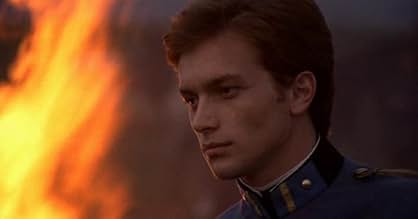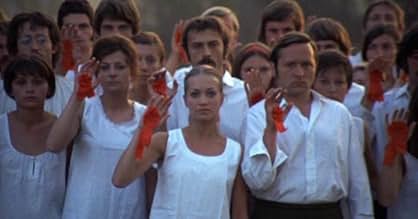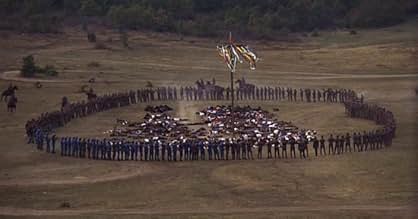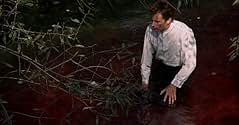AVALIAÇÃO DA IMDb
6,7/10
2,1 mil
SUA AVALIAÇÃO
Adicionar um enredo no seu idiomaSet in the 1890s on the Hungarian plains, a group of farm workers go on strike in-which they face harsh reprisals and the reality of revolt, oppression, morality and violence.Set in the 1890s on the Hungarian plains, a group of farm workers go on strike in-which they face harsh reprisals and the reality of revolt, oppression, morality and violence.Set in the 1890s on the Hungarian plains, a group of farm workers go on strike in-which they face harsh reprisals and the reality of revolt, oppression, morality and violence.
- Prêmios
- 1 vitória e 2 indicações no total
Avaliações em destaque
9thao
Here is something you have never seen before. A war musical with dancing naked women, armed men, choreographed walking, communist folk songs and poetic settings.
The film is based on peasant uprisings in Hungary that occurred between 1980 and 1910. The style is like something from a poetic theater. People hardly talk and everything is very staged. You might even say fake. Well, I suspect the message of the film is in the style. It is fake because communism and its origin was fake. It was an Utopia based on a lie. Miklós Jancsó was a socialist but not a communist (most people confuse the two) and he was critical of the direction his country was taking (as can be seen in other films by him). Here he gets the communist government to finance a film that looks like a glorious praise of the origin of the party while the style is telling us that this is all a staged lie. Don't believe it, any more than you believe that all these scenes are a realistic account of what happened.
The music is brilliant. Folk songs, many probably used in the peasant uprisings. I also liked the staging and the poetic imagery, like how a stigmata wound in the hand turned into a red flower, which looks like a French Revolution rosette cockade pin. And how many will die only because of one shot fired. And the use of doves, as symbols of peace and harmony, was beautiful. And the naked women? I guess they represent the innocence and the beauty of the peasant, who in their ignorance believed in the promised land.
You might not enjoy this film if you watch it as a straight communist propaganda. Watch it as a clever Trojan horse, pretending to be one thing while smuggling critical social commentary and you might get much more out of it. I for one liked this film for its bravery, its message, poetic beauty and for being like no other musical out there.
The film is based on peasant uprisings in Hungary that occurred between 1980 and 1910. The style is like something from a poetic theater. People hardly talk and everything is very staged. You might even say fake. Well, I suspect the message of the film is in the style. It is fake because communism and its origin was fake. It was an Utopia based on a lie. Miklós Jancsó was a socialist but not a communist (most people confuse the two) and he was critical of the direction his country was taking (as can be seen in other films by him). Here he gets the communist government to finance a film that looks like a glorious praise of the origin of the party while the style is telling us that this is all a staged lie. Don't believe it, any more than you believe that all these scenes are a realistic account of what happened.
The music is brilliant. Folk songs, many probably used in the peasant uprisings. I also liked the staging and the poetic imagery, like how a stigmata wound in the hand turned into a red flower, which looks like a French Revolution rosette cockade pin. And how many will die only because of one shot fired. And the use of doves, as symbols of peace and harmony, was beautiful. And the naked women? I guess they represent the innocence and the beauty of the peasant, who in their ignorance believed in the promised land.
You might not enjoy this film if you watch it as a straight communist propaganda. Watch it as a clever Trojan horse, pretending to be one thing while smuggling critical social commentary and you might get much more out of it. I for one liked this film for its bravery, its message, poetic beauty and for being like no other musical out there.
Note: This review was written in 2004.
Jancso's famous poetic film that was so much debated in our overly-politicized youth when it first appeared. A work flooded with music and singing, a continuous choreography-hymn to the revolution that wins the viewer overcoming rational resistance. Of course, the film is viewed very differently now in the years of a single world superpower than thirty years ago in the years of fermentation and hope. There is now a widespread disappointment about the film's issues, a skepticism about what it claims, and its optimistic finale is rather received with a sigh ...
The issue of the rebellion of oppressed peasants seems to belong to a very distant past, and the historical victory of the "people," where it happened anyway, did not evolve as its prophets dreamed of. It is also remarkable that the film seems to support a non-Soviet version of the revolution, where, as its leader states, "the land belongs only to those who cultivate it", meaning of course that it does not belong to the landowners - neither to the State, we conclude!
Also noteworthy are the religious connotations that (inevitably?) the revolutionaries give to their actions: after resisting the priests, as collaborators of Power, and after burning a church in a choreographic way, they set their own ritual: a People's "Sunday Prayer" a "confession and repentance" of the deceived villager who collaborated with the authorities and returns to the "People", a pagan funeral, etc. Obviously, at the time of the film (1972), all of these were part of the communist practice that tried to uproot the faith of the simple people, but also needed to devise ritualistic substitutes. Today, they are viewed as just another failed anti-Christian effort of a rigid ideological system.
Overall, Jancso's film is an enviable achievement of poetic cinema, where human characters are absent, since every person appearing is nothing more than a "bearer of ideology and history". With the continuous movement of the camera, the complete absence of interior scenes (the entire, absolutely entire, movie is filmed outdoors, in the endless Hungarian plain), music and dance, it captivates the viewer, apparently showing the way to directors who followed, like Bertolucci and Angelopoulos. Unfortunately the passing of time left its mark on the film copy and all its wonderful colors have degraded to a monochrome brownish. A film certainly worth the 1972 Cannes Film Prize.
Overall, Jancso's film is an enviable achievement of poetic cinema, where human characters are absent, since every person appearing is nothing more than a "bearer of ideology and history". With the continuous movement of the camera, the complete absence of interior scenes (the entire, absolutely entire, movie is filmed outdoors, in the endless Hungarian plain), music and dance, it captivates the viewer, apparently showing the way to directors who followed, like Bertolucci and Angelopoulos. Unfortunately the passing of time left its mark on the film copy and all its wonderful colors have degraded to a monochrome brownish. A film certainly worth the 1972 Cannes Film Prize.
In the book “1001 Movies You Must See Before You Die” eminent film critic Jonathan Rosenbaum wrote about RED PSALM being “…dazzling…awesome…ravishing…striking…it may well be the greatest Hungarian film of its time…”; conversely, Miklos Jancso'’s acknowledged masterpiece THE ROUND-UP (1965) – which I adore – is conspicuous by its absence in that singular pantheon. Besides, the late great film critic Raymond Durgnat wrote extensively about this film in his very last article published in 2002. Furthermore, Jancso' won the best direction prize at the Cannes Film Festival when Joseph Losey (whom I admire a great deal) was the President of the Jury and where RED PSALM was competing against such remarkable contenders as Robert Altman’s IMAGES, Harry Kumel’s MALPERTUIS, Peter Medak’s THE RULING CLASS and Andrei Tarkovsky’s SOLARIS! Why is it, then, that my star rating is such a lowly one?
There is no doubt in my mind that this is a key work in the director’s canon (which makes my underwhelmed reaction all the more painful to me) but, frankly, this is truly a case where form completely overpowers content or, to put it in the apposite layman’s terms, a film which can only be admired but not enjoyed. The main reason for this is that the entire running time (a relatively modest 81 minutes in PAL mode) is taken up by Jancso'’s obsession with politics and folklore with no space left for any real characters to emerge much less a discernible plot line. This would hardly be a problem in itself where it not for the fact that when somebody takes a break from the constant – and by now familiar – communal dancing marathons (which, thankfully, does mean that some of the typically stunning girls get to shed their clothing), they do so only to spout a litany of Communist diatribes which completely wear the viewer (and the film itself) down before long. Although Jancso'’s exuberant visual style always had a certain aloofness to it, I really didn’t connect at all with any of the characters or events depicted here. In fact, I’d go so far as to say that this is one time where the English subtitles (which, in themselves, are grammatically awkward and replete with spelling mistakes) distinctly felt like an intrusion and their verbosity detracted from the power of the meticulously composed images. Consequently, one’s enjoyment of the film as a whole suffers for it and given the generic, prosaic nature of the dialogue, I might well consider watching the film unsubtitled in the future! Amusingly enough, however, the Catholic prayer of Our Father is even blasphemously transformed into a Communist credo at one point.
Still, this is not to say that the film is completely worthless: the rebelling peasant farmers sing various songs (a couple of which are in English) that, while lyrically are merely propagandistic, are also melodically haunting. Given Jancso'’s penchant for lengthy, traveling sequence-shots (the film is said to contain a mere 26 in all!) which are, essentially, its true raison d’etre, some striking images can’t help but stand out, in particular the burning of a church by the peasants and their eventual massacre by the landowners’ army of defenders. Even more remarkable is Jancso' fusing his historical recreation with unexpected but decidedly welcome fantasy elements which sees dead people coming back to life with a kiss and, in an unheralded uproar to which nobody retaliates, an incensed peasant woman shoots several soldiers in quick succession single-handedly, etc.
As a result of my disappointing viewing of RED PSALM, I have decided to to take a sabbatical from Jancso' for now and postpone the three other films of his that I have in my possession to a later date (by which time, nevertheless, hopefully I would have acquired two more)…
There is no doubt in my mind that this is a key work in the director’s canon (which makes my underwhelmed reaction all the more painful to me) but, frankly, this is truly a case where form completely overpowers content or, to put it in the apposite layman’s terms, a film which can only be admired but not enjoyed. The main reason for this is that the entire running time (a relatively modest 81 minutes in PAL mode) is taken up by Jancso'’s obsession with politics and folklore with no space left for any real characters to emerge much less a discernible plot line. This would hardly be a problem in itself where it not for the fact that when somebody takes a break from the constant – and by now familiar – communal dancing marathons (which, thankfully, does mean that some of the typically stunning girls get to shed their clothing), they do so only to spout a litany of Communist diatribes which completely wear the viewer (and the film itself) down before long. Although Jancso'’s exuberant visual style always had a certain aloofness to it, I really didn’t connect at all with any of the characters or events depicted here. In fact, I’d go so far as to say that this is one time where the English subtitles (which, in themselves, are grammatically awkward and replete with spelling mistakes) distinctly felt like an intrusion and their verbosity detracted from the power of the meticulously composed images. Consequently, one’s enjoyment of the film as a whole suffers for it and given the generic, prosaic nature of the dialogue, I might well consider watching the film unsubtitled in the future! Amusingly enough, however, the Catholic prayer of Our Father is even blasphemously transformed into a Communist credo at one point.
Still, this is not to say that the film is completely worthless: the rebelling peasant farmers sing various songs (a couple of which are in English) that, while lyrically are merely propagandistic, are also melodically haunting. Given Jancso'’s penchant for lengthy, traveling sequence-shots (the film is said to contain a mere 26 in all!) which are, essentially, its true raison d’etre, some striking images can’t help but stand out, in particular the burning of a church by the peasants and their eventual massacre by the landowners’ army of defenders. Even more remarkable is Jancso' fusing his historical recreation with unexpected but decidedly welcome fantasy elements which sees dead people coming back to life with a kiss and, in an unheralded uproar to which nobody retaliates, an incensed peasant woman shoots several soldiers in quick succession single-handedly, etc.
As a result of my disappointing viewing of RED PSALM, I have decided to to take a sabbatical from Jancso' for now and postpone the three other films of his that I have in my possession to a later date (by which time, nevertheless, hopefully I would have acquired two more)…
10hmn18
It was the first time i encounter a Hungarian filmmaker when i watched, by mistake Red psalm.
The movie surprised me on many layers Beyond all the expectations that i had before i watched it: An exceptional treatment of the image and the cinematography. With only 27 cuts, Jansco manages with his moving camera and his choreographed scenes to tell a story that is so transparent, so poetic, and so close to the heart.
A small group of farm workers, some songs and some rifles, thats all what took jansco to make a fascinating movie, although one can argue that the communist manifestation in the movie is direct, but one must not forget the environment and the mentality through which a group of farm workers in a simple field in the Hungarian countryside may accept or refuse a way of thinking and of acting, the thing that the director was aware of completely.
The dancing, the songs, the movements, and the theatrical monologues, all in all , even the name , "Red Psalm" and its sweet resonance in the ear as much as the movie is pleasing for the eye, all those factors make the movie rather a sweet love poem, a piece of poetry that teaches love, revolt and solidarity,
Chapeau Mr. Miklos !
The movie surprised me on many layers Beyond all the expectations that i had before i watched it: An exceptional treatment of the image and the cinematography. With only 27 cuts, Jansco manages with his moving camera and his choreographed scenes to tell a story that is so transparent, so poetic, and so close to the heart.
A small group of farm workers, some songs and some rifles, thats all what took jansco to make a fascinating movie, although one can argue that the communist manifestation in the movie is direct, but one must not forget the environment and the mentality through which a group of farm workers in a simple field in the Hungarian countryside may accept or refuse a way of thinking and of acting, the thing that the director was aware of completely.
The dancing, the songs, the movements, and the theatrical monologues, all in all , even the name , "Red Psalm" and its sweet resonance in the ear as much as the movie is pleasing for the eye, all those factors make the movie rather a sweet love poem, a piece of poetry that teaches love, revolt and solidarity,
Chapeau Mr. Miklos !
The Red Psalm is an almost unapproachable film these days; the filmmaking practises of today have made us western viewers forget how to watch films that are not made to entertain.
The Story is simple enough: the Red Psalm depicts the rise and fall of a peasant revolt in the earliest days of socialism. The focus is on the reasons why it doesn't succeed, rather than on characters and plot. In fact, to use words like "character" and "plot" in connection to the Red Psalm would be misguiding.
This is an example of a film where message dictates the cinematic language of the film. It is not meant to be a realistic depiction of the living conditions of the peasants in the late 19th century. Instead it tries to depict realistically the reasons and causes of such tragedies in general. The film is full of what some people would call "gaffes", but they are there just because it does not matter if the actor has his wristwatch on or whether the guitar has nylon strings. That kind of authenticity is only superficial.
All in all, The Red Psalm is an ultimately challenging viewing recommended for everyone who is looking for alternatives to Hollywood pap. It demands the attention of the viewer throughout, because it is not generic in any way. Yet it is not without its flaws. It is extremely slow paced, full of folk dancing and saturated with socialist propaganda. Yet features like Jancso's free flowing camera should interest at least wannabe filmmakers to this challenging and complex film.
The Story is simple enough: the Red Psalm depicts the rise and fall of a peasant revolt in the earliest days of socialism. The focus is on the reasons why it doesn't succeed, rather than on characters and plot. In fact, to use words like "character" and "plot" in connection to the Red Psalm would be misguiding.
This is an example of a film where message dictates the cinematic language of the film. It is not meant to be a realistic depiction of the living conditions of the peasants in the late 19th century. Instead it tries to depict realistically the reasons and causes of such tragedies in general. The film is full of what some people would call "gaffes", but they are there just because it does not matter if the actor has his wristwatch on or whether the guitar has nylon strings. That kind of authenticity is only superficial.
All in all, The Red Psalm is an ultimately challenging viewing recommended for everyone who is looking for alternatives to Hollywood pap. It demands the attention of the viewer throughout, because it is not generic in any way. Yet it is not without its flaws. It is extremely slow paced, full of folk dancing and saturated with socialist propaganda. Yet features like Jancso's free flowing camera should interest at least wannabe filmmakers to this challenging and complex film.
Você sabia?
- CuriosidadesIncluded among the "1001 Movies You Must See Before You Die", edited by Steven Schneider.
Principais escolhas
Faça login para avaliar e ver a lista de recomendações personalizadas
- How long is Red Psalm?Fornecido pela Alexa
Detalhes
- Tempo de duração1 hora 27 minutos
- Mixagem de som
- Proporção
- 1.37 : 1
Contribua para esta página
Sugerir uma alteração ou adicionar conteúdo ausente

Principal brecha
By what name was Salmo Vermelho (1972) officially released in Canada in English?
Responda




















